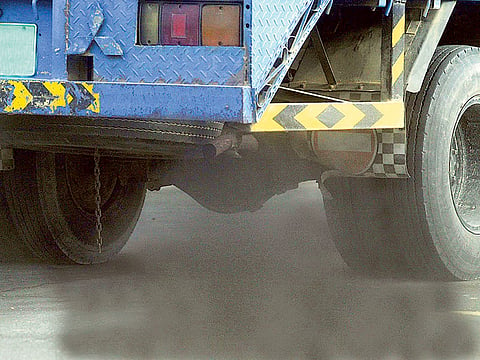Regulations for better air quality
Environment ministry reviews car emissions and heavy industry to protect health of residents

Abu Dhabi: Government limits on emissions from car exhausts, power plants and heavy industry in the UAE are being tightened for cleaner air across the country, experts said on Tuesday in the capital.
Following a clampdown by the Ministry of Environment and Water several years ago on polluters who emit suspended pollutants into the UAE atmosphere, the ministry is seeking to further shore up UAE legislation to protect the health of millions of residents.
Increasing prevalence rates in the UAE of breathing disorders such as asthma in children, for example, lend urgency to new regulations demanding clean, breathable air, experts said.
Fahd Hareb, Director of Air Quality Department at the ministry, said on the first day of the Air Quality and Noise Control Conference on Monday that a review for the allowable emission levels for vehicles in petrol and diesel engines is currently under way.
“We would like to see more environmentally friendly vehicles such as those that run on electricity. We want to create incentives for people to use those vehicles and to ultimately remove old, high-emission vehicles from the streets of the UAE,” he told Gulf News.
The latest push to strengthen national air quality standards could put new teeth in existing laws on the books such as Federal Law No 24, enacted in 1999 to impose “standards and limits” on pollution-emitting corporations and individuals.
New air-quality laws to create a new “national police to improve air quality” were reviewed by the environment ministry in 2012 to help protect more than 9 million UAE residents and help them breathe easier.
Additionally, the environment ministry is hoping to make the otherwise highly technical Air Quality Index (AQI), available to the public in a simplified manner.
“The AQI is a daily index developed to represent our air quality and is a simplified representation of the data to determine the extent of air quality at each National Air Quality station throughout the UAE,” he said.
“By making the data public we are hoping to address air quality concerns and to make individuals become inspectors and encourage them to identify and report incidents of things that can ultimately affect their health and that of others to the concerned authorities,” Hareb added.
In fact, the pre-existing Abu Dhabi Environment Agency (EAD) web portal to monitor air quality is currently highly used by school students but experts wish that more individuals use this service for their own benefit.
“Going to the www.adairquality.ae website enables users to see how good or bad the air quality is in their area that day and help them make the necessary adjustments to their day accordingly, especially for more sensitive individuals such as children and asthmatics,” said Ruqaya Mohammad, manager of Air Quality, Noise and Climate Change at the EAD.
Individuals are encouraged to report cases of environmental pollution to local authorities and to monitor air quality in their local neighbourhoods to determine whether additional precautions need to be taken on a given day.
BOX
Air quality index Air quality
0-50 Good
50-100 Moderate
101-150 Unhealthy for sensitive groups
151-200 Unhealthy
201-300 Very unhealthy
301-500 Hazardous
Sign up for the Daily Briefing
Get the latest news and updates straight to your inbox


